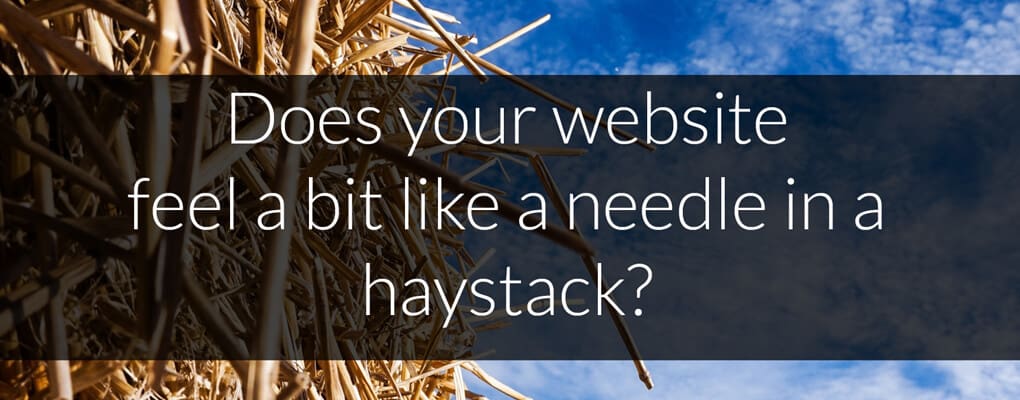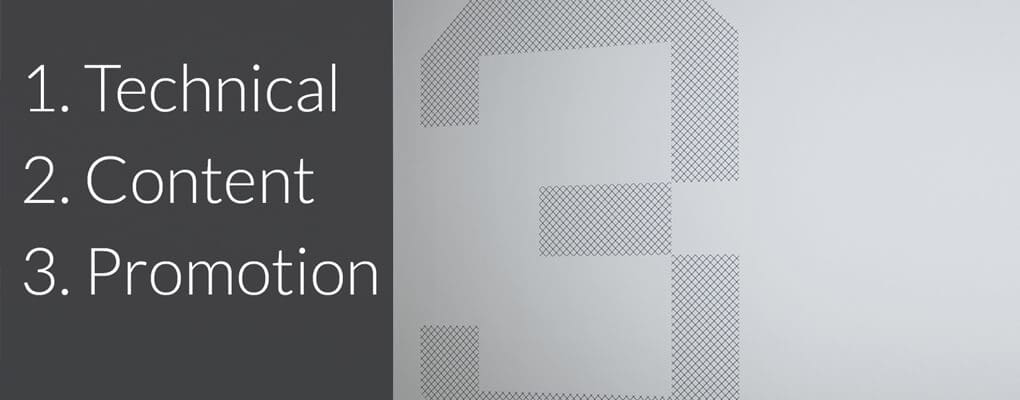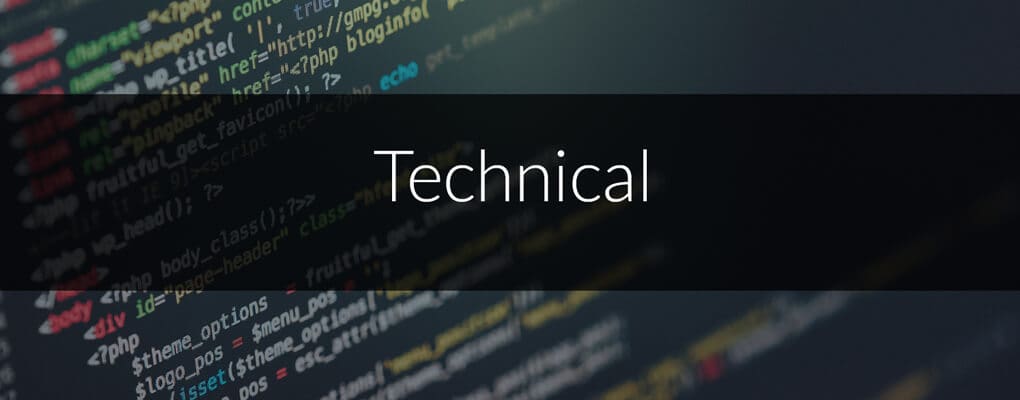Search Engine Optimisation – Get The Basics Right First – Your Quick Start Guide to Effective Website SEO
In May 2017 I had the opportunity to present a seminar at the Sheffield Business Show. The topic of my presentation was – Search Engine Optimisation - Get the basics right first - Your quick start guide to effective website SEO. My aim was to provide maximum value and non-technical Search Engine Optimisation insight to empower businesses to get started with their Search Engine Optimisation or to be informed buyers of Search Engine Optimisation services.
If you were unable to attend the Sheffield Business Show, you can view my slide deck, watch the video and read my presentation transcript below.
Presentation Slides
Presentation Transcript
Timestamp: [00:01:00]
I'm Belinda White from a web consultancy, Arttia Creative. So I'm doing a short talk on Search Engine Optimisation. I'm going to try and keep it fairly light-hearted because it's quite a dry subject, so bear with me. This is what I do day to day, at my desk, is building websites and Search Engine Optimisation.
So what is Search Engine Optimisation?
It's to do with getting found on Google. Does everybody know kind of what it is? So what I'm going to talk about is, I'm not going to go into too much detail. It's going to be quite a high-level view. My aim is for you to be able to go away and have a bit more of understanding about it and demystify it a bit.
So for me, Search Engine Optimisation is being found for the right thing at the right time by the right people, the right audience that you're trying to reach. That's the fundamentals. And predominantly it's getting found here on Google's search page. And that's called the search engine results page.
Timestamp: [00:02:00]
And SEO is all about getting found there, so if that's where your audience is, if that's where they're searching for what you do, that's what SEO is trying to achieve, for you to get higher there. So is that all making sense?
And, when you're developing your SEO strategy, there are elements that you can use, not just for Google. Once you've got a plan in place, it will guide you and help you also on social media. So, all the social media channels have some search facility; YouTube is the best. That's the second biggest search engine. So when you're thinking about search engine optimisation and keywords and content, it also has the impact here. When you're investing your time in SEO, you can use it in several places.

Timestamp: [00:03:00]
Does your website feel a bit like a needle in a haystack?
So the idea there is that there are millions of websites, lots of content and your site, your content might be in there somewhere, a bit like a needle and how do you get it found? How do you stand out? So, yeah let's get the ball rolling. So we want to get some basics right first before you try, and do anything technical or advanced, and also what I'm trying to do as well is demystify it a bit.
There's a lot of misinformation about SEO, it's a bit mysterious, and some people think it's a bit of a dark art. But it's not. Once you understand the fundamentals it's actually common sense. There's a lot of common sense around it. So, my plan is to try and demystify that for you.
Timestamp: [00:04:00]
The other thing about SEO is it's not a sprint. It's not something that will happen quickly, so it's an investment in a longer strategy. It will give you benefits for longer rather than considering it as quick fix. If you do need to get high on Google quickly, then you go for the paid route, so paid advertising. SEO isn't paid advertising; it's the organic area and data wise, the organic area is the most clicked on. So the adverts are 20% of the clicks, the other 80% is all the natural results. People will click there rather than the advert. And also the advertising on Google, the prices are increasing all of the time. When I started out doing SEO, some of the clicks were pennies.
Timestamp: [00:05:00]
Now, some of the keywords and clicks you're looking at several pounds. Some of the competitive phrases can be £20-30 a click. So it's very expensive to do the advertising. It does get you there faster. So the idea behind SEO and the organic results is that over time it should be a better cost investment.
Yeah, it's more of a purposeful climb to the top. So, it's a long-term investment of your time and your strategy and reaching out to the audience. And it is a big subject; there's a lot of factors in it, there's a lot of detail which I can't go into everything in half an hour. So I'm just going to cover a few bits that hopefully, if you get those basics right, you can go away today and kind of, start to put things in place or let your team know how to do that. And, again, because it's the internet, it's constantly changing, it's constantly evolving.
Timestamp: [00:06:00]
And if I could predict what was going to happen, I'd probably be quite well off. Hopefully, some of the things we're going to talk about will give you a good foundation, so that if Google's algorithm does change, which it constantly does, if it changes dramatically hopefully the bits I'm going to talk about, the changes will have less impact.
That's not good. Right, so we're going to look at three elements of SEO on your website that when they work together, will give you the greatest impact. Those three elements are the technical bit, the content and promotion. Now, I'm not going to get too technical today, but I am going to have to touch on a little bit of the technical side, just because of the nature of what it is. So, I'm going to go through each section in detail, and give you some actions that you can do, some overarching insight so you can get a better understanding.

Timestamp: [00:07:00]
So, I'm going to go through each section in detail, and give you some actions that you can do, some overarching insight so you can get a better understanding.
Fundamentally there are these three elements that will impact SEO for your website. So, technical, I'm going to go through this bit first, just to get it out of the way. It is a little bit technical, but hopefully, I'll try and put it across in a way that isn't too technical. So, the technical side of it is how your website is built. Now I don't expect you to kind of know or want to know too much of the technology behind there, but it's good to know that if it's well built or well put together, Google is going to be able to index it and understand it faster and easier if it's been properly put together. And I know that you're going to be relying to a certain extent on your web team to do the technology right.

Timestamp: [00:08:00]
There are more and more people doing their own websites on various platforms. So it's good to know that or check that your site's technically well built. It's going to help your SEO journey.
Check how well it is built, is to hook it up to Google's Search Console. Most websites want to track some data will have Google Analytics hooked into it, yeah? Most businesses' websites will have Google Analytics there. It's free to use; there's lots of data. Now, the Google search console is a separate tool. Again, it's free to use, but you do need to activate it, to verify it and to get it talking to Google Analytics. The two things are more powerful working together.
Timestamp: [00:09:00]
So if you just, you go onto Google and search for Google search console, it will come up. It used to be called Google's Webmaster Tools. They've recently changed it so that it gives you much more kind of search information. Originally it was a tool very much for the kind of technical side of websites, but it's very much focusing on search. So, that would be my first aspect of technical. If you set that up, get it linked, get it talking to each other then you'll get extra information that you don't get on Google Analytics. So you will get information about the search queries that your site is showing up for. But you'll also get lots of other tools down here that you can check if Google can index your site.
Timestamp: [00:10:00]
Once that's hooked up, that's not that technical to look at, and if it does flag any issues, it will be there and you can highlight those to your web team. So it's a really good tip to get that hooked up to your website, alongside Google Analytics.
There are various navigational links there and you can click on it and check the indexing, check how many pages it's indexing, does it give any crawl errors? The other reason you need to get this hooked up is for something called an XML sitemap. So this is the only technical bit I'm going to go into but it's well worth doing. Anybody heard of an XML sitemap? No? What it is, it's a file that collates all of the pages of your website and it tells Google what priority to index those pages.
Timestamp: [00:11:00]
If you don't have an XML sitemap, Google is, it's crawling millions of websites, and over that time, it would just do it when it gets around to it. If you've got an XML sitemap it kind of prompts Google and says go and have a look at these pages first, prioritise my site when you're re-crawling the internet and you're more likely to be indexed by Google faster.
So, a lot of the website builders out there, they should have somewhere where you can create an XML sitemap. Otherwise, you'd have to do it manually. There are some tools. I think things like Wix and Weebly, they do, or Squarespace, they do give you a facility to create an XML sitemap at the touch of a button. If you're on something like WordPress there are different tools to do that. But once you've created an XML sitemap, you load it here and then Google then knows, "I need to prioritise those pages, I'm going to find them faster".
Timestamp: [00:12:00]
So that's just one element there. And as I say the search console, it just flags that stuff. So, when I go into the next bits of content and promotion, it's no good doing those bits if Google's not indexing the site correctly. It's going to miss some pages. There might be broken pages; there might be some errors. So, it's worth doing that and communicating that to your work team to get that underway.
Then another aspect of technical is page speed. That is a factor that Google is looking at regarding rank and results. So page speed can be affected by quite a few things, your hosting. If you're on a shared hosting and your site is starting to get lots of content, then it might load slowly, because it's on shared hosting where there are thousands of websites.
Timestamp: [00:13:00]
So if speed's critical for you, check your host and you might have to upgrade it to a better server. Also with page speed, if you've got lots of content, lots of photographs, you might want to optimise those photographs, and there are various tools for doing that. Got to keep the file sizes down.
Also, the reason that Google is focusing on page speed is mobile. People are out and about, checking out websites on their phones, on their tablets. And, depending on their internet connexion, if you've got a very heavy site regarding speed they might not be able to load any of the content. So, that is a factor that it's looking at regarding page speed. But also Google looks at page speed, not the website speed. It will do an overall kind of assessment; so, it's good to test the speed of a few pages on your site, because different pages will have different content.
Timestamp: [00:14:00]
So test a few, and also test a few pages over a period. So some days your internet connexion might be faster, it might be slower, there might be other things happening in the area that will affect it. And there are some tools there that will help you check the page speed.
So, Google has its tool for checking page speed. That's how we know that it's important to Google. There's Pingdom. There are lots of different tools. These are free to use. Put your web page in, test, and you can check the speed. They typically give you some hints and tips on what to improve. And also with technical, think about mobile first. Regarding the stats, mobile is creeping up towards desktop usage so if your site's not mobile ready; it's not responsive, then potentially Google can index that lower. It will show you lower on the mobile search results.
Timestamp: [00:15:00]
There is talk that Google is going to further split out the search algorithm into mobile and non-mobile. So it's worth making sure that your website is responsive, it looks good on mobile as I said because mobile use is increasing all of the time.
So, just to recap there on technical. Three things to take away today. Just check that Google can index the site in the first place, is it missing any pages? Up to date XML sitemap. Now I've put up to date because if you're creating regular content, which is great for SEO, every time you're adding pages and information, in theory, you should upload a new sitemap. So, I think some of the page builders in the DIY software, you still have to do that manually. However, if you're using something like WordPress and you've got the Yoast plugin on, Yoast does it automatically.
Timestamp: [00:16:00]
If you hook it up to your search console and if you're creating blogs in WordPress, adding new content in WordPress, you don't have to worry about it. Yoast will just keep updating that sitemap all the time, so Google knows that you want those pages indexing. So that's an excellent tip.
And yeah, just check the page speed. If your page is taking five, six, seven seconds to load, that might be an issue. It could be that your audience you know they're going to be at their desk in an office that has broadband, that might not be an issue. It could be that your audience is always on mobile and they're out and about, so you need a site to be quite lightweight and quickly load.
So that's everything on technical, hurrah! That's the technical bit out of the way.
Now we're going to look at the sweet goodness that is content. So when you're planning your content, having SEO in mind is a real benefit.

Timestamp: [00:17:00]
I work on a lot of projects where I retrofit SEO which is fine. However, it's much easier and faster and has more benefit if you can do it first. That's if you're refreshing your website. But also if you're creating new content, if you think about SEO while you're doing it, it's going to give you a benefit.
So when you're planning your content, you research your audience. This will give you information about the type of search phrases they might put in, the places where they hang out in terms of their social media. So if you get a picture of your audience, that's a good guide for your SEO. And then research your keywords. So once you understand your audience and the type of phrases they might put in then you can keep that in mind when you're putting in your keywords, doing some keyword research.
Timestamp: [00:18:00]
Because the phrases you put in, or you think that your audience might use, they might not use. So it's good to do some research, create a list, create a spreadsheet, about the different phrases.
Now, I'm just going to go a little bit in depth here regarding keywords and your audience, just to give you an idea of creating your content for different stages of the SEO journey, as it were. So, as a customer or your audience, you're going to have different stages where you're trying to find out about a problem, a business, a solution. Early on in their search, they're probably going to use broad phrases. So broad search information, they're trying to figure out what their problem is, what needs solving.
Timestamp: [00:19:00]
So you want to create some content that is very broad, and then as they move down after they've done some research on Google, they've found a bit more information. They know what their problem is, so they have slightly different search phrases, so tighter searches. And they're looking for who to solve it or how to solve it. So again you're creating content on your website that answers that question. And then finally when they've gone through that journey and they're ready to buy, they know I can trust who you are because they've found out who can solve it the best and they know what action to take.
You can create content for that stage where they're ready to buy. And that might be a little bit tricky to understand so I've done a little illustration here. Now I've based this on somebody's searching for search engine optimisation, so awareness, it might be well, what is it? Do I need it? What is it all about? So that's very top level in terms of Search Engine Optimisation.
Timestamp: [00:20:00]
If I was creating some content to answer that question it would be a very broad content. Then when they understand what it is, it's like okay, I understand that so how do I rank on Google, what do I do? Can I do it myself, do I need to buy into? So it's another set of keywords and phrases and content that I want to create. So I could talk to them at that stage, and then when they're ready to buy they might think actually I can see how much works involved, it's not something I really want to do so I don't want to DIY it, I want to find someone to do it.
So again, it's another set of search phrases and content. So as you're building the content on your website, you're trying to answer those questions. And as you're answering those questions with your content, you can put in the key words and key phrases that you need. Does that make sense, or is that a bit weird? No, that's all right. So when you're doing some keyword research, there are various tools that you can use. Some of these are free, some of them are paid for.
Timestamp: [00:21:00]
If you do need to use one of the paid for tools, it's worth perhaps paying for it for a month, or a couple of months. Do your research, then you don't have to pay for it again. So a lot of them are kind of per month subscriptions.
So in terms of the research, you're thinking about keywords for each stage of that journey. People are going to type in different information. So I would create a spreadsheet for the different stages of the journey, keyword phrases. I'd run it through these systems and just find out the search volume. If there's a phrase I think I want to go for the volume of people searching for that might be really low and the effort of creating content around that might not be worth it. It's good to check out the search volume around that and how competitive it is. If you've come up with a phrase where it's very high competition then you know that there's going to be quite a bit of work to do because everyone is competing for that phrase.

Timestamp: [00:22:00]
Also, it tells you that if everyone's competing for it that it's valuable. It's worth some time and effort because that phrase means that's potentially somebody that's going to convert into a customer. A lot of people will be chasing that phrase.Another part of
Another part of content is how fresh the information is on your website. Google does love frequently updated websites. It will rank a website above another site that hasn't been updated for a couple of years. Also, your audience loves fresh content as well. It lets them know that you're business is proactive, they care about their customers, they want to share some information. It's got the latest information on it. It looks like they care about their business and Google will like it as well.
Timestamp: [00:23:00]
Regarding keeping your website content fresh, that's why people are doing blogs. They're doing news stories. It gives them an opportunity to add new content to their website so that Google has got a bigger picture of what they do, more in-depth information about their services, how they solve problems. You can create case studies that show you how you can niche into an area. It gives you just some deep information about your business that Google then understands but also gives value to your customers.
When you're creating new content to keep your website fresh, it gives you the opportunity to add more keywords and phrases. It gives you more opportunity to show up in the search results. You can answer more questions that your audience might have and offer that value. Also, with creating new content if you think about the searcher's intent
Timestamp: [00:24:00]
I'm going to go into a slight bit of detail here. I hope this makes sense. When people are typing in search phrases into Google, the phrase they put has an intent. I'm going to illustrate this with this here. All these questions here are questions about SEO, but in none of them, it says SEO. If you were creating content that just said SEO, search engine optimisation, you wouldn't show up.
You can see how people are putting in different phrases, but their intent is information about that. When you're creating content, blogs, information, you want to make that content rich with those types of topics, phrases, semantic search. You're not necessarily always aiming for one key phrase. You might be looking at variations around that. In your piece of content, you could cover a couple of those questions.
Timestamp: [00:25:00]
There's another example here that if the company just put in buying airline tickets as their top keyword, then those were all the variations around that topic. The searcher's intent is they want that, but they're asking all those sorts of questions. Your content needs to reflect the range of questions that could be asked in Google. Rather than targeting one thing or what you do it's what are those questions around that.Does that make sense?
After that heaviness, we've got a cute dog. Content as well is all about or is also all about user experience. If you appear in the search results, somebody clicks through, and they get to your site, and it's not a very good user experience that's not great, so you have a sad dog.
Timestamp: [00:26:00]
User experience itself is a huge topic I could talk about for ages, but I'm just going to do high level. Things like clear navigation, all those elements add to the user experience including the design aesthetics. If you are in the search results were expecting to see. Well, we do a lot of scientific websites so, people would expect to see something that looked very professional, very slick, very science based.
If I were searching for a restaurant I'd want the aesthetics of that site to reflect that restaurant, the type of meal. That is part of the user experience. The design does have an impact, and then there's a happy dog. If it's a good user experience, people are going to be happy. They're going to spend more time on your website. They're going to hang around. If they don't like your website, it's going to affect something called your bounce rate.
Timestamp: [00:27:00]
With SEO there are lots of elements. I'm just trying to focus on one or two things to think about. The bounce rate, which you might have heard of to do with SEO, is this bit here in your analytics. The bounce rate means that if someone has landed on your website they've looked at one page and they haven't found what they wanted, they weren't that happy. They just disappear.
They haven't clicked on anything else. That's part of user experience. You've gone through that SEO process to get shown on the search results, they click, they've bounced off. They haven't found what they wanted. If that's high that's not great. I will caveat that with some pages might have a high bounce rate. If you think about it, something like a contact page, that might have a high bounce rate because people are just getting your phone number and they disappear.
Timestamp: [00:28:00]
Other core content pages where you're trying to give them some information, trying to get them to do something, they really should have a lower bounce rate because you want them to hang around more. You want them to read the article and perhaps click through to your services, so they've made more of a journey on your site.
User experience does come into that. Content comes into that. It needs to be engaging, relevant. There's something else that can happen as well if the user experience isn't great. That's something called pogo-sticking. Again I just tried to get funny images in. It can cause searchers to do something called pogo-sticking, which we think Google doesn't like. That's what that means. They've got a search result. They believe that it's relevant to the problem they're trying to solve, what they're trying to do. They click on it, go to your site, it's not what they thought. There's a mismatch between what it says there and where they end up on the page. They click back.

Timestamp: [00:29:00]
They go back to the search results. Google does monitor that. It's called pogo-sticking, and if your search result constantly causes that effect, Google's likely to push it down the rankings. Does that make sense?
In terms of content, those are three takeaways I'm hoping that you're going to have with that. Keyword research, audience before you're creating your content. Make sure the content is up to date, regular content. Regular doesn't mean to say you have to do it every week. It could be every month as long as it's regular. Google does get to understand that there are regular things happening on your website. Think about the user experience. User experience is a big area that I can't go into now, but it's worth thinking about.
Timestamp: [00:30:00]
Some professional bloggers blog every day, sometimes twice a day. The thing that might have an effect if you're putting out content regularly is the quality. The content has to be well written, well crafted, relevant, interesting, not too short. Google classes that as thin content. If you want to create content every day, it has to be of a reasonable quality and useful. It doesn't mean to say you can't do it, but if you're churning out that much information it needs to be all with high quality. I'd say quality over quantity regarding content.
So, that's three takeaways there. Then onto promotion. If I just backtrack a little bit, technically you've checked it, your web site is well built.
Timestamp: [00:31:00]
Google is indexing it fine. It's finding everything. Then you've created your content. It's speaking to the right audience. It's got keywords in it. It's answering questions. It's good quality. The user experience is there. Brilliant. There are millions of websites on the internet. Who knows you've just done it? You've got to promote it because the internet is a busy place. There are lots going on, and you need to let people know that your content is there. Content marketing via things like social media, outreach. That's things like creating back links, contacting influencers in your business, in your sector so hopefully, those influencers will look at your content and share it with their audience. You could do the paid route.
Timestamp: [00:32:00]
Indirectly email marking, so if you're doing newsletters or campaigns, you might have links to new articles that you've produced. That directly doesn't affect your search results, but then once someone clicked on your news article on their email, gone to your website they might dig further and then Google does track that. It does have an impact.
You can do guest blog posting and cross-links. That will help build your audience. Regarding promotion, you need to do it a lot. I say the internet is a busy place. Typically that's the kind of ratio you're looking for. If you're spending [inaudible 00:32:38]. So, promote your content a lot because it will drive traffic, which is great for SEO and it does build something called page authority and domain authority. Again, this is a little bit techy, but I'll put it in because that's good for SEO. Google does look at what they call page and domain authority.
Timestamp: [00:33:00]
There's a free tool here that will tell you what yours is, what your competitors are. If you're doing outreach, it will tell you what their domain or page authority is. For example here, I've got the Sheffield Business Show, domain authority, page authority. The higher numbers you get there, out of 100, means the websites is an authority, it's well valued, and it's worth getting backlinks from them. It's worth trying to get yours higher, so you become an authority. It's a little bit difficult to understand how Google does track that, but we know it has an impact.
Some of the best ones are the news and the BBC, the biggest domain authority. For instance, if you could get an article on the BBC's website with a link back to your site that will dramatically affect Google's understanding and the way it sees your authority.
Timestamp: [00:34:00]
That's hard to do, but if you can do things like that will help. Just as another example, that's the Huffington Post. They've got a very high domain and page authorities. That's why people like to go over there, put their articles on, put their website link on their page link because that, they will pass on some of their authority to you. Google sees that if those high authority websites have a link to your website from theirs. They see that as an endorsement, so that has an impact.
Timestamp: [00:35:00]
If you put into Google, Moz Open Site Explorer, it comes up, and it's free to use. It's useful for checking out your competitors, see what they're ranking for if they've got higher page and domain authority you can then see that you need to do a bit more work on your site so you can compete on that level. Those factors do have an impact on the search results.
If you're trying to beat your competitors or get above them, then if they're higher than you then it's going to have that impact.

Timestamp: [00:36:00]
It's not necessarily; you might think okay I've put new content up why isn't it showing up? It's just Google hasn't cached it yet, or the Moz crawler hasn't cached it yet.
Promotion, that 80/20 rule, you can see that's a lot of effort in terms of promotion. You can use automation to push it out there. It will help. You can punctuate that with putting out promotional information that's not automated. There are automation tools. There's a few. You've probably heard of some of them. They will help you regularly push out that content that you're creating so you can set that up and let that run. It's almost like an advertising feed going out all the time. You can make that look less spammy with things like having a range of different headlines, different leads there, etc.
Timestamp: [00:37:00]
Regarding promotion, just to go over that there, that's three things. Go where your audience is, whatever social media channel they're on. Promote as many times as possible, not just the first week you've produced that content. Keep promoting it. I've got content on my site that is over a year old that still drives loads of traffic because it's ... It's not pushed in everyone's face, but it's regularly pushed out there a little bit to say, "This is still here." New people come and read it all the time. Then that will build your authority, and you can check your authority on Moz's tool there. Getting the basics in place. Your foundation is making sure it's just technically okay; Google can index it. Then relevant content, up to date content, great user experience. And then promote it.
All those three things when working together will start to impact your SEO. That's me. That's what I do most of the time. I build, optimise, promote websites for lots of different brands, people. Any questions?
The Takeaway.
There are three main elements for maximum Search Engine Optimisation results.
- TECHNICAL
- CONTENT
- PROMOTION
If you need help with each or all of these essential SEO elements, then get in touch for a 15-minute website accelerator session.